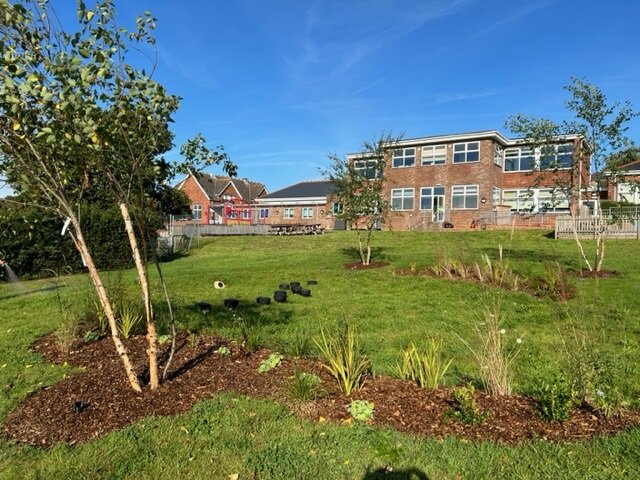
Isle of Wight Schools play their part in reducing storm overflows by embracing nature-based solutions
Schools on the Isle of Wight are helping to reduce the impact of heavy showers on local sewers – by slowing the flow of rainwater across their roofs and play areas.
Schools on the Isle of Wight are helping to reduce the impact of heavy showers on local sewers – by slowing the flow of rainwater across their roofs and play areas.
Nettlestone Primary School and Haylands Primary School in Ryde are embracing a number of innovative sustainable drainage installations which will reduce the risk of flooding and in turn help Southern Water cut the use of storm overflows.
By slowing the flow of water from hard surfaces like classroom roofs and playgrounds, sewers are less likely to see huge jumps in volume in short timeframes – which can go on to trigger storm water releases into the sea and local rivers in order to protect homes, businesses, schools and communities from flooding.
Both schools are having specially created swales installed in their grounds - long shallow channels, set in meadow grassland and home to other plants too. These hold water flowing down slopes on the site, allowing it to sink into the grass, rather than just running straight off into drains or becoming standing water.
They will also benefit from unique planters – also known as raingarden planters – which sit underneath drainpipes. These store surface water for a short while before it slowly returns to Southern Water’s network.
The schools are among more than 40 others across the region that had Sustainable Drainage Systems (SuDS) installed as part of Southern Water’s £1.7m joint initiative with the Department of Education.
The schools on the Isle of Wight that took part and are now benefitting are listed below.
Ryde Academy; Bembridge Primary School; Brighstone Church of England Primary School; The Bay School; Cowes Primary School; Northwood Primary School; Dover Park Primary; Oakfield Primary School; Binstead Primary School; Chillerton and Rookley Primary School; Yarmouth Church of England Aided Primary School; Wootton Community Primary School, and Holy Cross Primary School.
Southern Water will soon be announcing the next phase of the project, with more than 50 more schools signing up to take part.
The project forms part of the work by Southern Water’s Clean Rivers and Seas Task Force aimed at significantly reducing storm overflows on the Isle of Wight and beyond. The team are using innovative nature-based and engineering solutions, slowing the flow of ground and surface water that enters the sewer network. Installing SuDS in the community not only prevents flooding and pollution incidents, but they can also provide environmental, social and placemaking benefits too. This is being underpinned by crucial partnership working with businesses, schools, councils and highways teams.
Nicole McNab, Southern Water’s Clean Rivers and Seas Task Force Strategic Communications and Partnership Delivery Lead, said:
“Schools like Nettlestone and Haylands are playing a big role in our work to reduce storm overflows across our region. Their help is making a real difference in reducing the amount of water entering our network and helps us ensure healthier rivers and seas. We’re looking forward to replicating these fantastic projects in more schools across our region in the coming months.”
A spokesperson for the Department of Education, said:
“The Department of Education and Southern Water have partnered on the installation of larger SuDS projects at 4 schools across the south of England. This is in response to the increasing frequency and severity of rainfall events due to climate change. SuDS, or sustainable drainage systems, are designed to mimic natural drainage processes, slowing down the flow of rainwater and reducing the risk of flooding.”
